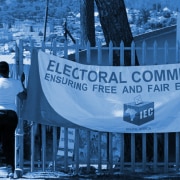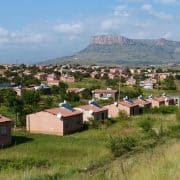|
Getting your Trinity Audio player ready...
|
Without a consistently well-performing government, corruption-free with strong financial controls and integrity in the civil service, writes former human settlemens spokesperson Yonela Diko, the governing party’s manifesto becomes a wish list to hoodwink people into voting for them and not a decree to live and die by.. The step aside resolution may help to remedy the situation.
By Yonela Diko
First published on Eyewitness News
The biggest threat to the African National Congress’s (ANC) survival and its political legitimacy is corruption. The loss of government revenue due to corruption makes a mockery of the very publicly stated aspirations of the governing party. Without a consistently well-performing government, corruption-free with strong financial controls and integrity in the civil service, its manifesto becomes a wish list to hoodwink people into voting for them and not a decree to live and die by.
The legitimacy of the ANC as the organisation of the people with state power was one of the strong messages of Nelson Mandela at the 1997 Mafikeng conference. As Mandela watched fellow former freedom fighters, having lived in bushes and camps, underground and prison, now fully in charge of the state and its resources and courted by wealthy businesspeople and others of means for their influence and access, would the revolutionary conscience of each comrade stand the test of being in charge of the state?
Madiba sought to appeal to this revolutionary conscience of comrades, never to forget where they came from, who they had been fighting for, and who this Reconstruction and Development was for. Every penny counted. Madiba always had high confidence in his abilities of persuasion and may well have done a great job even then. Madiba however, did not at that stage, seek to institutionalise anti-corruption within the ANC. It may well be that the institutions of government to fight corruption were deemed enough and that those who would be corrupt within the ANC and government would in any case not be those so high up that such corruption would not be swiftly dealt with by the leader of the day.
Not institutionalising anti-corruption within the ANC was a great oversight. This left individual leaders, more pronounced at the level of the President, the singular burden to fire comrades. As we witnessed in 2005 when the then-President Thabo Mbeki fired the Deputy President, Jacob Zuma, without the ANC taking charge of that process as an institution, personality politics emerged and the country has not been the same since. In 2005, Zuma would have been asked to step aside by the ANC, freeing the President of the political burden of firing his own comrade and saving the Republic from the fallout that would follow after. Today we would be living in a different country.
HIGH PRICE OF CORRUPTION
The price the ANC has paid over the years for failure to institutionalise anti-corruption is too high. Corruption has had a high price on development. It has led to the government hindering the very development it purports to pursue. Corruption has become the very stumbling block in the implementation of government policies and programmes. Corruption has robbed the country of its much-needed resources, in health, social safety net, education, and has led to rewarding of undeserving recipients of services and exclusion of the poorest of the poor. It has also caused the general destabilisation of the country’s governing institutions.
Over the years corruption has also moved the very state apparatus from formal processes and protocols into informal operations of the state which must now supersede the formal operations, with decisions taken in dark corners and formal institutions merely being implementing agencies of the informal structures.
Why did the ANC allow its deployees to be a wrecking ball within the state? Why did this revolutionary organisation allow its legitimacy, its voter power, its electoral support, to dwindle to a point where losing state power became so palpable. As ANC deployees ran amok, devastating everything in their wake, the ANC finally learnt that an organisation that has no mechanisms to control its deployees will be destroyed by the very deployees.
In this devastation of the state, looting and self-enrichment, comrades began to see each other as rivals to this largesse and not as partners in the pursuit of a better life for all our people. In this contest, politicians saw their embezzling of the state in much different eyes than ordinary people. Perpetrators of such corruption felt justified and saw the accumulation of state resources for personal gain as their only means to outcompete political rivals. Such corruption is used to reward supporters, advantage funders and support groups, and, of course, raise funding for the next election.
This then forces these leaders to identify pliable and willing businesses to be part of the patronage. So for contracts to favour these businesses, a certain amount or percentage is due to the political programme. Even though these politicians may be aware of the destruction their actions have on the country, usually they don’t see any other way for them to retain power and control.
Institutionalising anti-corruption through the step-aside rule means the ANC now has one singular mechanism to stop these rogue deployees in their tracks, before they can do much damage to the organisation and to the government of the people.
CORRUPT LEADERS ARE A CANCER
The first task of corrupt leaders is to weaken party and government institutions. This then discourages even the most dedicated civil servants who want to serve honestly and diligently as they see their work making no difference, their colleagues getting economic rents and their place largely insecure.
Then institutions start to flounder, resources to run them become inadequate, no supplies and equipment, and a staff complement that has decided not to care. Once civil servants make more money in corruption and economic rents than their own salaries, then every transaction becomes a source of illicit income. Even international companies begin to appreciate that for them to get deals in this country, they must pay their way in.
Step aside, as a potent tool of the organisation, will and must put an end to these criminal enterprises operating within the state.
CORRUPTION IN SOUTH AFRICA
Public sector corruption can be defined simply as abuse of public office for private gain. It is when officials solicit payment in exchange for advantaging certain people or companies. It is also the distribution of patronage, nepotism and circumventing of public processes
On a daily basis in our country, reports of firms being given supply contracts without due process, government officials’ wives having stakes in companies doing business where their husbands’ work, contracts awarded dubiously, fill our daily newspapers. Companies are issued with licences without following process, others with exclusive licences, and yet others receive permits and registration papers without following any strict protocols
While corruption may be at the instruction of politicians, bureaucrats too can lead corruption, independent of politicians. Individual enrichment at the expense of state resources cuts across administration and political landscape.
“Step aside” hopefully will free all government entities of such rogue elements.
SOLUTIONS
There remains much work to be done by the ANC in institutionalising anti-corruption. The very fact that we can still elect questionable characters, some with pending criminal cases, others with criminal records, means our mechanisms are still not tight enough. The people we elect into our organisation are the very pool from which we must choose government deployees. We have to thread carefully.
We need to protect our political organisations and our institutions of government from corruption. Our civil service must be free from economic rents and be meritocracy led. We need to have in place all mechanisms to fight corruption, such as audit institutions, ombudsman and even government watchdogs.
We need ethics in our politics and public service. We need strong financial controls. We cannot fight the triple threats of poverty, unemployment and inequality with a failing state.
Yonela Diko is the former spokesperson to the Minister of Human Settlements, Water and Sanitation. You can follow him on Twitter: @yonela_diko







